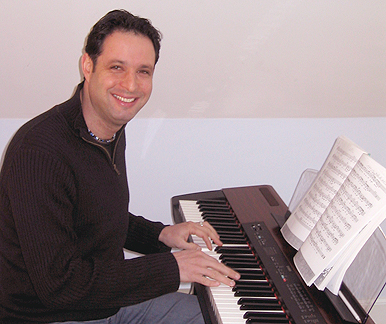Fine-tuning stroke therapy
GRAMMY Foundation honors BU researcher for music rehabilitation technique

Amir Lahav (SAR’06), a doctoral student at Sargent College, is a musician and a composer, but it’s his work in rehabilitation science that has won him a GRAMMY award to study the use of an interactive music therapy for stroke patients.
Lahav, in the last stages of his studies in the Music, Mind and Motion Lab of the SAR department of physical therapy and athletic training, was recently awarded a $40,000 grant by the GRAMMY Foundation to investigate the rehabilitative potential of techniques in which stroke patients use their affected limb to create music and then listen to the music they have created. The foundation was established by the National Academy of Recording Arts and Sciences, which gives out the annual Grammy Awards.
Here at BU, Lahav has been working on several projects, including the development of music technology and treatment techniques for improving motor function in patients with physical disabilities. Meanwhile, at the Beth Israel Deaconess Medical Center, a teaching hospital of Harvard Medical School, he has done brain-imaging studies that explore auditory-motor interactions in the human brain.
“The clinical concept behind this therapy,” Lahav says, “is that movements will become more controlled, coordinated, and purposeful when patients use their body limbs in order to play music, rather than exercising along with background music.” The grant will be used to test, in a clinical setting at Harvard Medical School, how well these techniques work.
Some of Lahav’s methods have been employed at the Music, Mind and Motion Lab, where he has been testing his Virtual Music Maker — a human-computer interface that converts body movements into sounds, allowing patients to create music while performing prescribed therapeutic exercises. For example, a wave of the patient’s hand in front of a specially equipped webcam reads the speed and movements and translates them into music and a digital image projected onto a wall.
As a musician, Lahav knows that even the able-bodied face challenges and frustrations playing a piano or guitar. He developed the Virtual Music Maker, which does not require extensive training or special musical talent, to help stroke patients play music. The movements required to play the music are designed to mirror activities that are essential in daily life, Lahav says, such as opening a door or reaching for a cup. The music acts as a reward when the nervous system is under control, which in turn helps the patient regain motor function.
Lahav believes that his therapy may not be limited to stroke victims, but could extend to other neuromuscular disorders such as traumatic brain injury and Parkinson’s disease or even to physical rehabilitation following orthopedic surgeries.
“The GRAMMY grant is definitely one of my personal bests,” he says, and he is grateful for the foundation’s support of his research. He plans to begin work this summer.